June 28, 2025

The article titled "7 Essential Behavior Interventions for Effective Classroom Management" addresses the critical need for educators to implement key strategies in managing classroom behavior effectively. It underscores the significance of structured interventions and frameworks, such as Positive Behavior Interventions and Supports (PBIS) and Behavior Intervention Plans (BIPs). These approaches have been demonstrated to significantly enhance student behavior and academic outcomes. By fostering a supportive learning environment and addressing individual needs, educators can create a more conducive atmosphere for learning.
In the evolving landscape of education, effective classroom management has never been more critical. As schools grapple with increasing behavioral challenges, it is essential to explore strategies that enhance classroom dynamics. This article delves into seven essential behavior interventions that not only promote positive learning environments but also address the diverse needs of students. Educators must consider:
The pressing nature of this question underscores the urgency for actionable insights in today's educational context.
[Hire ABA](https://hireaba.today) connects (BCBAs) with premier job opportunities, addressing a projected 25% increase in demand for BCBAs by 2026. In 2024, job postings for BCBAs surged by 58%, underscoring the urgent need for qualified professionals in the field. Our platform leverages advanced job fit scoring to identify opportunities that align with the skills, preferences, and desired locations of BCBAs, streamlining the hiring process.
Are you facing challenges in finding the right talent? Hire ABA tackles obstacles such as low compensation rates and staffing shortages, ensuring that schools and organizations can effectively locate the right professionals to implement successful interventions.
With personalized guidance and top-notch support throughout the application to negotiation process, we facilitate successful job matches that advance the careers of job seekers and enhance the capacity of educational institutions to effectively address behavioral needs through behavior interventions.
As industry professionals emphasize, the growing demand for BCBAs is crucial for meeting the varied requirements of learners and clients, making platforms like Hire ABA indispensable in today's job market.
Don't miss out on the opportunity to connect with the talent you need—partner with Hire ABA today.
[Positive behavior interventions and supports (PBIS)](https://pbis.org/resource/is-school-wide-positive-behavior-support-an-evidence-based-practice) is a robust, evidence-driven framework designed to enhance behavior interventions and improve academic performance across educational environments. By establishing clear behavioral expectations and consistently reinforcing positive actions, PBIS implements behavior interventions that foster a supportive educational atmosphere conducive to learning.
Research indicates that institutions implementing behavior interventions, such as PBIS, experience , with children in these settings being 33% less likely to receive office discipline referrals compared to their peers in non-PBIS institutions, as evidenced by a study involving 12,344 elementary-aged children. Furthermore, the framework correlates with greater academic success; schools with high-fidelity PBIS execution report enhanced outcomes in math and reading, alongside reduced truancy rates. Higher SW-PBIS fidelity is linked to these improved student results, underscoring the framework's effectiveness.
As of 2025, PBIS has been adopted in over 16,000 schools nationwide, reflecting a substantial increase in recognition as a vital approach for managing conduct. Effective PBIS frameworks emphasize the importance of teaching appropriate behavior interventions, recognizing positive actions, and utilizing data-informed decision-making to guide practices. Additionally, ongoing training and support are essential for the successful implementation of behavior interventions, ensuring that this comprehensive approach not only addresses immediate behavioral challenges but also fosters long-term emotional and social development among students, solidifying PBIS as a cornerstone of effective classroom management.
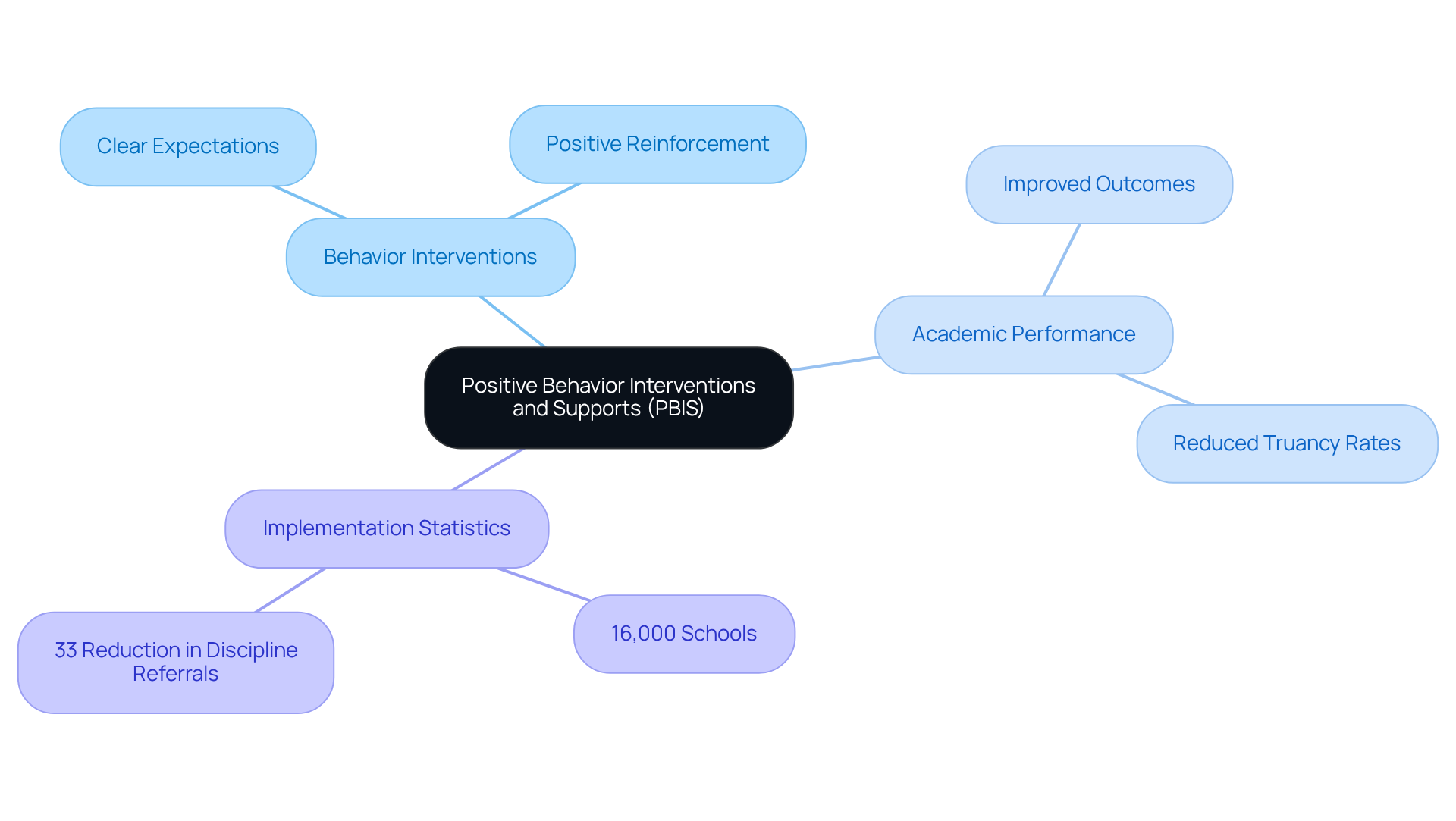
Applied Behavior Analysis (ABA) encompasses a diverse array of methods aimed at enhancing specific behaviors through the use of behavior interventions. With a growing demand for Board Certified Behavior Analysts (BCBAs), the importance of cannot be overstated. Methods such as reinforcement, prompting, and modeling are not merely theoretical; they can be effectively implemented in classrooms as behavior interventions to foster positive behavior and mitigate negative actions. Educators trained in ABA possess the skills to assess learner behavior, implement behavior interventions, and adapt strategies to meet individual needs, thereby cultivating a supportive learning environment.
Consider the current hiring challenges you face. Are you struggling to find qualified professionals who can deliver these essential ABA techniques? By utilizing Hire ABA for recruitment, you can connect with experts who are not only knowledgeable but also experienced in applying these methods in real-world settings. This platform offers a reliable solution to enhance your team's capabilities and ensure that your educational environment thrives.
In conclusion, leveraging the expertise of ABA-trained educators is crucial for promoting effective learning. Take action today by exploring how Hire ABA can support your recruitment efforts and transform your educational approach.
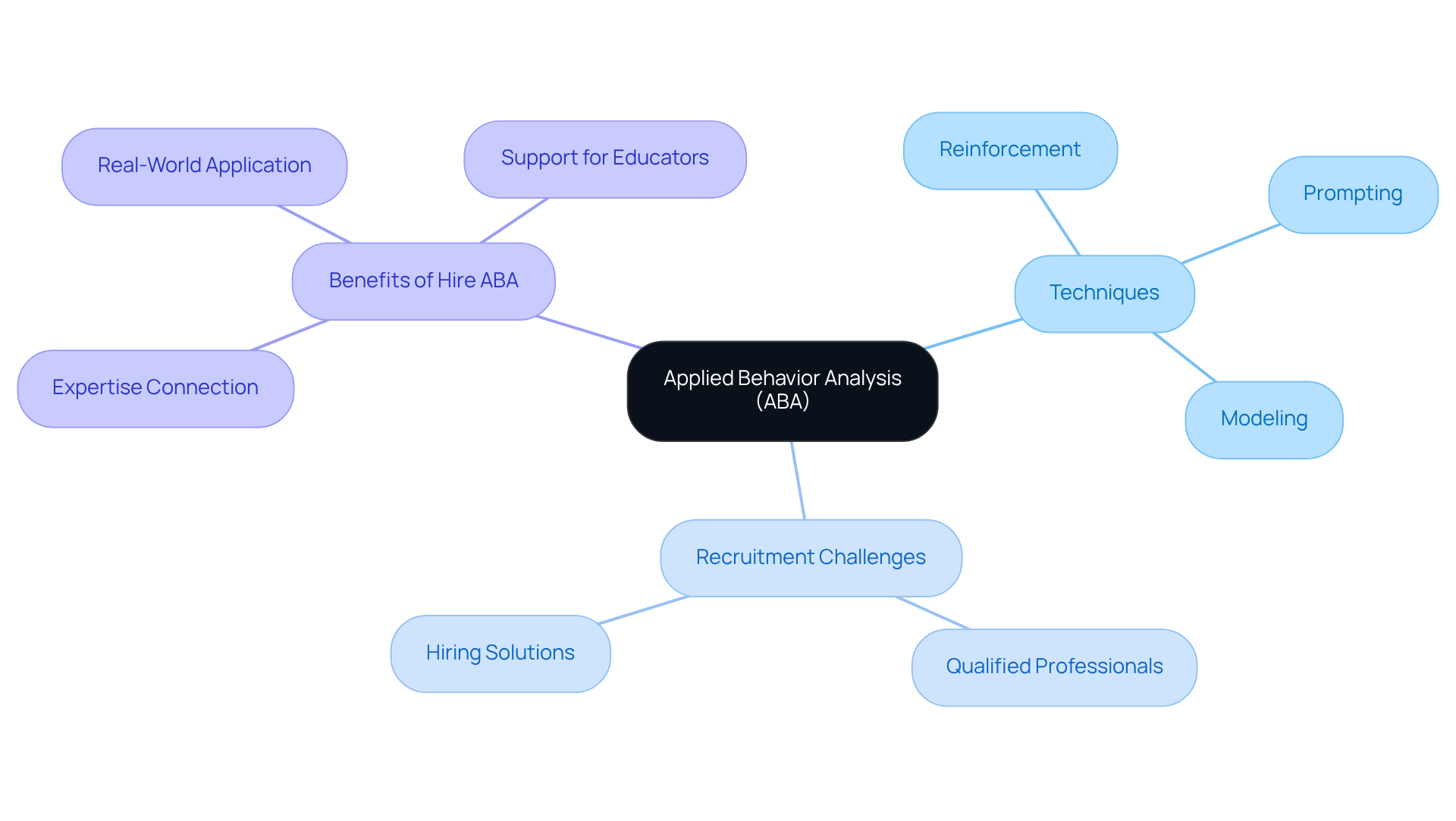
Classroom-Wide Function-based Intervention Teams (CW-FIT) is a proactive strategy that incorporates behavior interventions to enhance learner engagement through structured group contingencies and positive reinforcement. This model establishes clear conduct expectations and provides consistent feedback, significantly reducing through the implementation of behavior interventions and fostering a supportive classroom environment.
Notably, successful applications of CW-FIT in various schools have demonstrated its effectiveness. For instance, one study revealed a decrease in disruptive actions among learners from an average of 43.8 incidents during baseline to just 20.4 incidents during CW-FIT sessions. Furthermore, learners' on-task behaviors improved considerably, with averages rising from 59.9% to 78.6% during the intervention.
The CW-FIT model not only empowers teachers to collaborate and share effective management strategies but also underscores the importance of group dynamics in cultivating a positive learning atmosphere. Educators have reported that implementing behavior interventions, including group contingencies, leads to substantial improvements in classroom behavior, reinforcing the concept that a well-structured strategy can transform learner engagement.
Current implementation rates of CW-FIT in schools reflect a growing acknowledgment of its advantages, as many educators advocate for its adoption to enhance instructional time and learner outcomes.
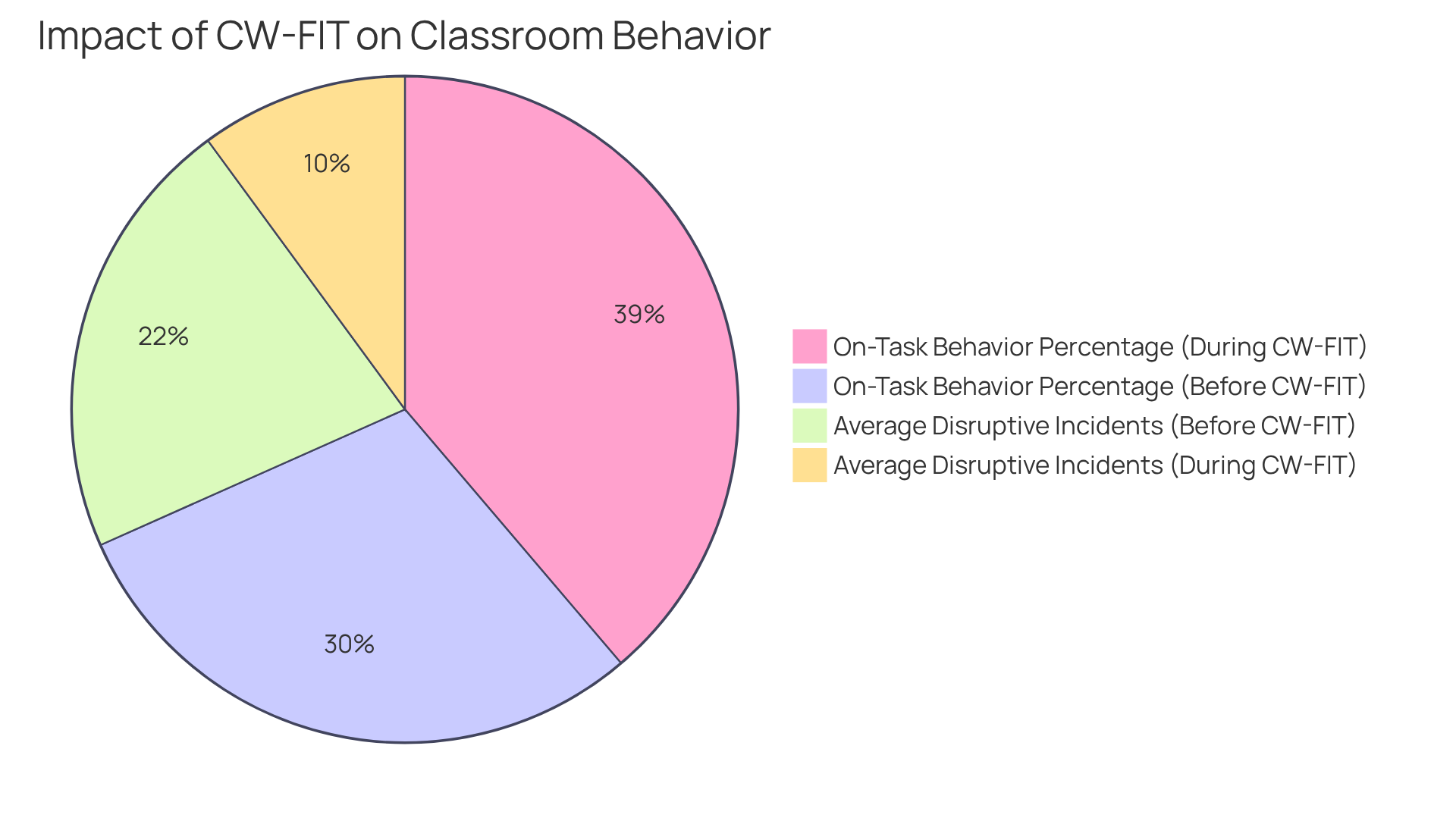
Behavior Intervention Plans (BIPs) are a critical strategy in implementing behavior interventions to address the unique behavioral challenges faced by learners. These personalized plans are not merely guidelines; they are comprehensive frameworks designed to foster positive change. A well-structured behavior interventions plan (BIP) encompasses:
By actively involving parents and educators in the development of behavior interventions, schools can cultivate a holistic approach that empowers students to effectively navigate behavioral obstacles. This collaboration is essential, as it ensures that the strategies employed are not only relevant but also sustainable, ultimately leading to .
Consider the impact of a well-executed BIP: students gain the tools they need to succeed, and educators are equipped to support their growth. Are you ready to embrace this comprehensive strategy in your educational setting? The time to act is now, as the benefits of BIPs extend far beyond the classroom, paving the way for a brighter future for all learners.
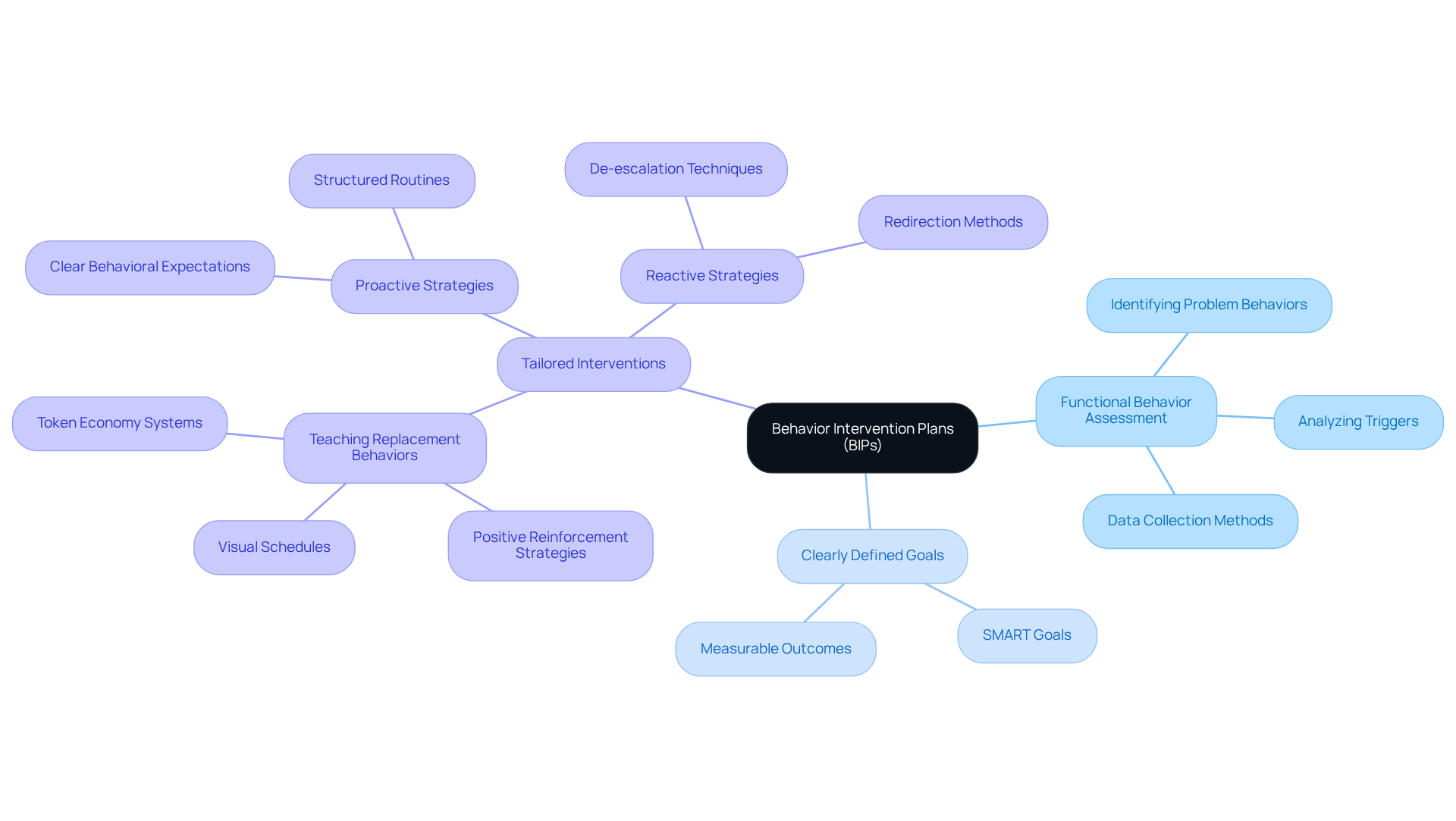
Proactive classroom management approaches are essential for preventing behavioral issues through effective behavior interventions before they escalate. Establishing clear rules and engaging lesson plans creates a structured environment that significantly reduces disruptions. Research indicates that behavior interventions, specifically classroom behavior management methods, are effective for 80%-85% of learners when applied in a tier-based approach.
By anticipating potential challenges and addressing them proactively, educators foster a positive classroom atmosphere that enhances learner engagement and academic performance. Schools employing classroom analytics have reported a 12% rise in graduation rates, illustrating the impact of data-driven strategies on learner success.
Furthermore, educators emphasize that clear expectations not only direct learner actions but also foster a sense of ownership and responsibility among participants. As Christina Whalen, Director of Research at RethinkEd, stated, 'When learners understand the rules and see their relevance, they are more likely to engage positively in the learning process.'
This cooperative method of encourages learners to take an active role in their education, ultimately resulting in improved outcomes in both conduct and learning.
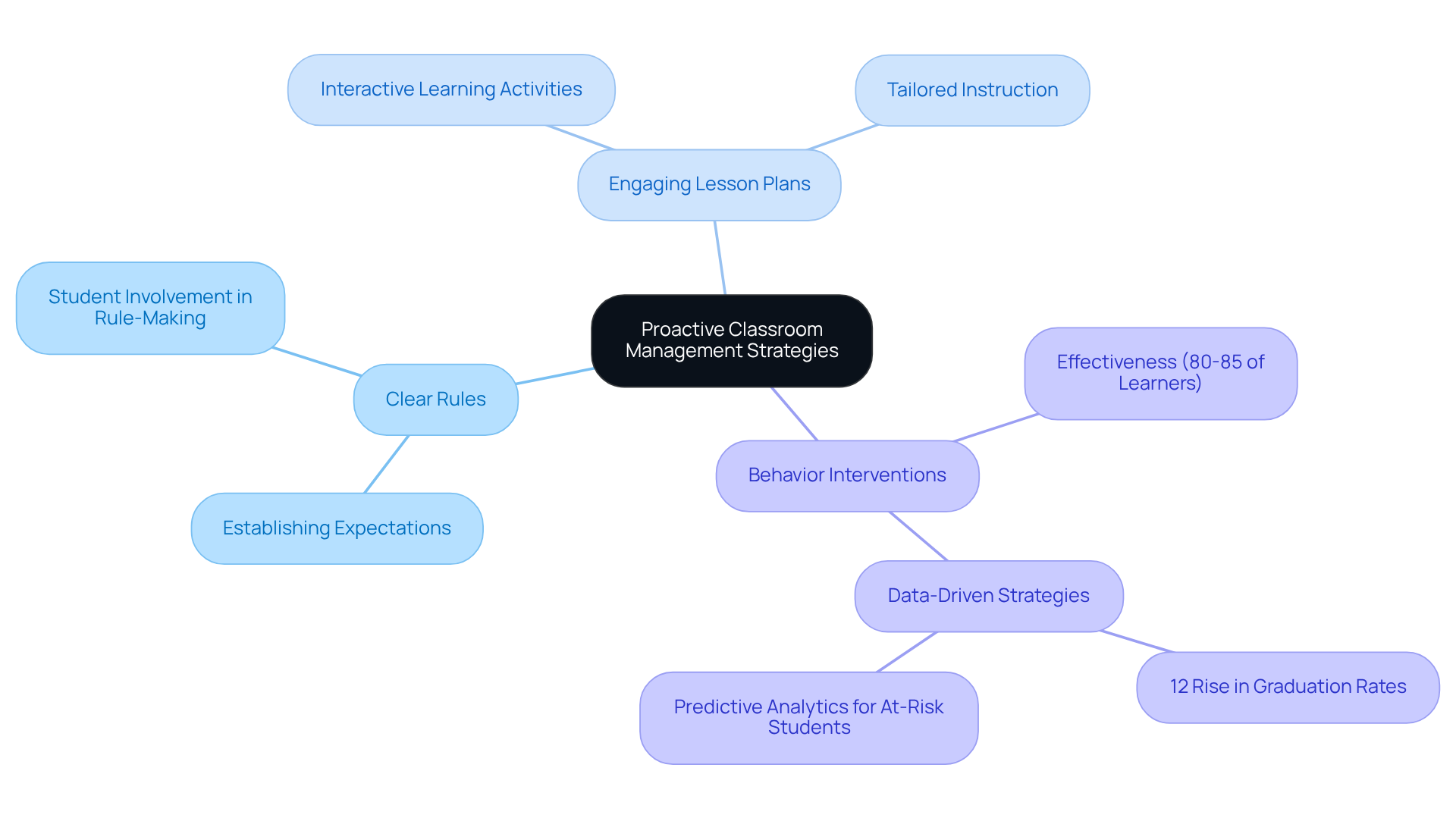
Effective teacher training in behavior interventions is essential for equipping educators with the skills needed to manage diverse classrooms. Did you know that schools investing in ongoing training can significantly empower teachers? Professional development initiatives should emphasize evidence-based approaches such as:
Research indicates that behavior interventions, such as training, lead to improved classroom management and increased learner engagement. In fact, effective professional development can result in a 21% improvement in learner performance, underscoring the direct connection between teacher training and educational outcomes.
Moreover, current trends highlight the incorporation of technology in training, allowing educators to utilize behavior interventions efficiently with digital tools in their management strategies. By nurturing a culture of ongoing education and adjustment, schools can establish an atmosphere where both educators and learners flourish. Are you ready to invest in the future of education? Embrace effective teacher training to transform your classrooms and enhance learner success.
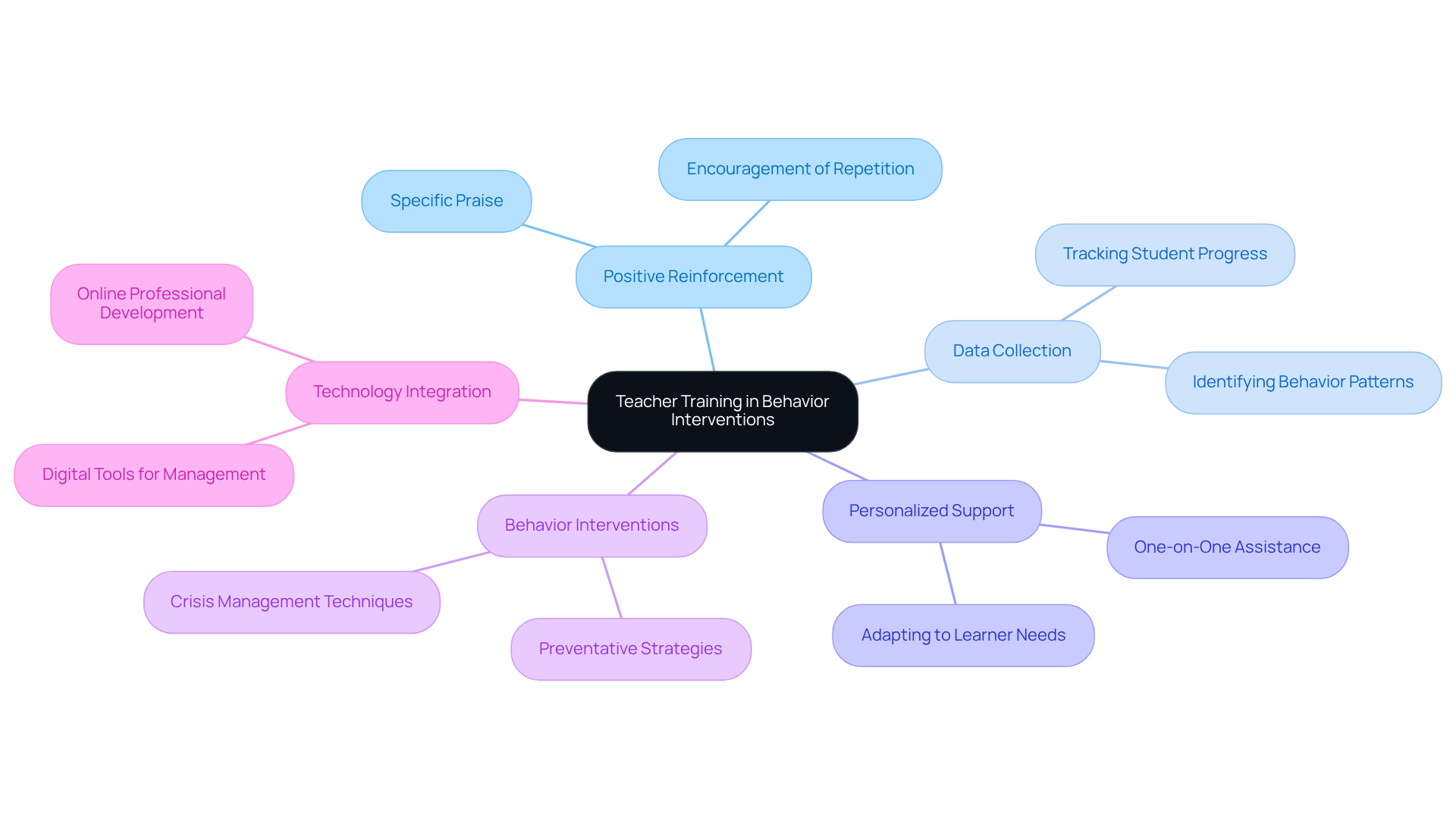
Positive reinforcement methods are essential for encouraging preferred actions in learners through rewards or incentives. These rewards can manifest in various forms, including:
Research indicates that when educators consistently acknowledge and promote positive actions as part of behavior interventions, learners are more likely to engage in appropriate conduct, thereby fostering a supportive classroom atmosphere. As of 2025, the focus on effective reward systems has intensified, with analysts advocating for tailored approaches that align with individual motivations.
The successful implementation of these strategies, including behavior interventions, not only enhances learner involvement but also leads to improved academic performance. Effective types of rewards include:
All of which significantly contribute to a positive learning environment.
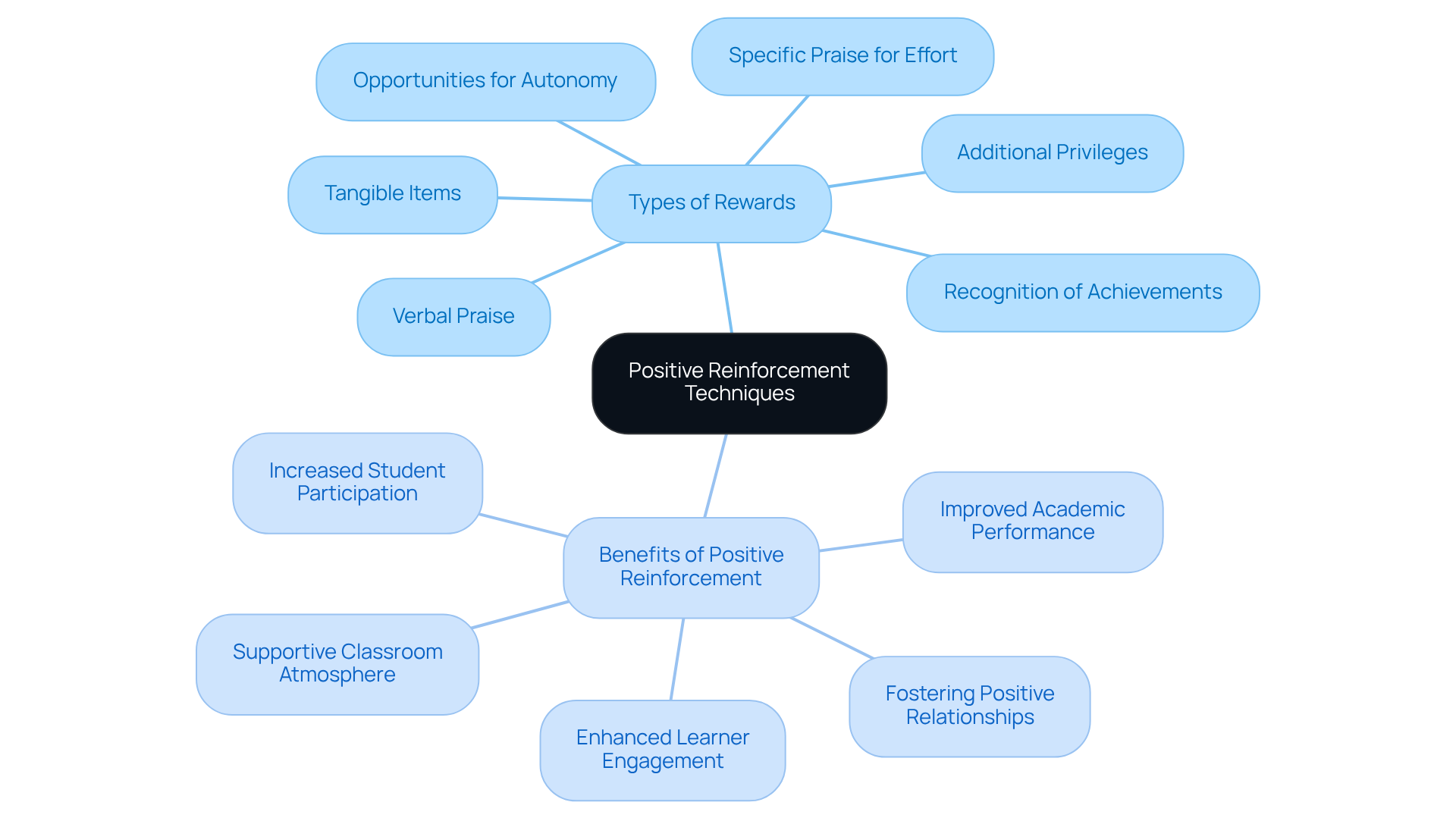
Data gathering and examination are fundamental to the success of behavior interventions within educational environments. By systematically monitoring learner actions and the outcomes of interventions, educators can evaluate their effectiveness and make informed modifications. Current trends in monitoring tools—such as ABC data collection, frequency recording, digital logs, and specialized software—facilitate this process, allowing for real-time data entry and analysis. These tools not only simplify data gathering but also empower educators to make that significantly enhance learner support and achievement.
As one educator noted, 'Utilizing data to guide our choices has transformed how we manage conduct in the classroom.'
Looking ahead to 2025, the assessment of intervention effectiveness will continue to rely on robust data gathering techniques, ensuring that interventions are tailored to meet the unique needs of each learner. Ongoing data collection is crucial for optimizing therapy outcomes, and training data collectors in these methodologies can further bolster the effectiveness of interventions.
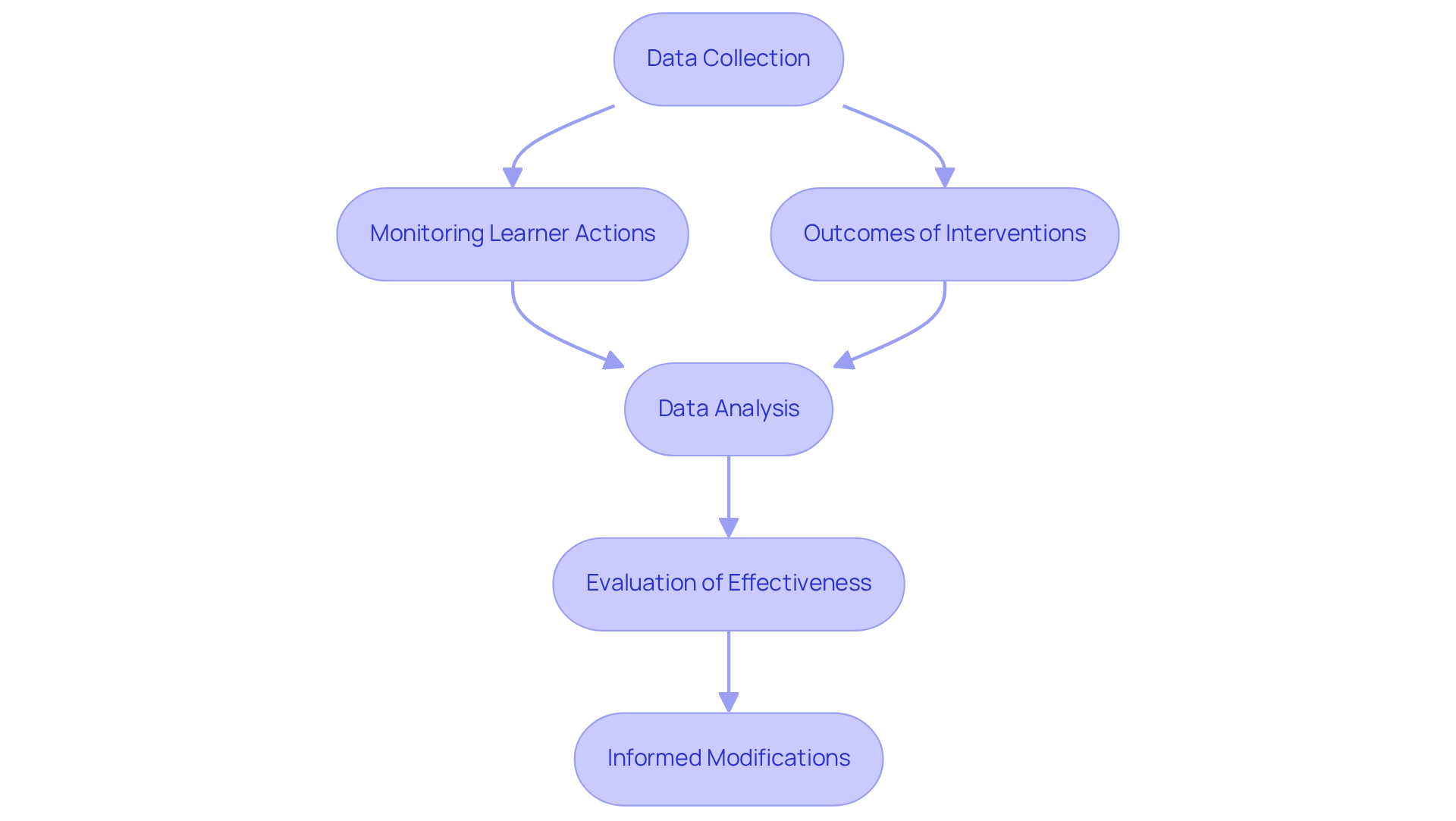
Cooperation between teachers and parents is essential for the effectiveness of behavior interventions. Open channels of communication enable both parties to exchange insights regarding learner conduct, facilitating the application of uniform approaches that promote learner development. Regular meetings and progress updates not only keep parents informed—evidenced by a mean score of 3.13 on a scale of 1 to 4 reflecting their feelings of being well-informed about the institution—but also empower them to actively participate in their child's educational journey.
Collaborative goal-setting significantly enhances the effectiveness of behavior interventions, ensuring that learners receive comprehensive support in both school and home environments. Research indicates that learners with engaged parents score 10-15% higher on standardized tests, underscoring the impact of strong parent-educator partnerships. As SARAH ROBERSON stated, "Parental involvement can make or break a child’s education journey."
Through collaboration, educators and parents foster a that greatly aids learners' academic and personal achievements. Furthermore, teacher-family communication increases the likelihood that students complete their homework by 40%, emphasizing the importance of ongoing dialogue. Notably, 67% of families felt more connected with their child's day-to-day education during the pandemic, illustrating the evolving nature of parent-teacher collaboration.
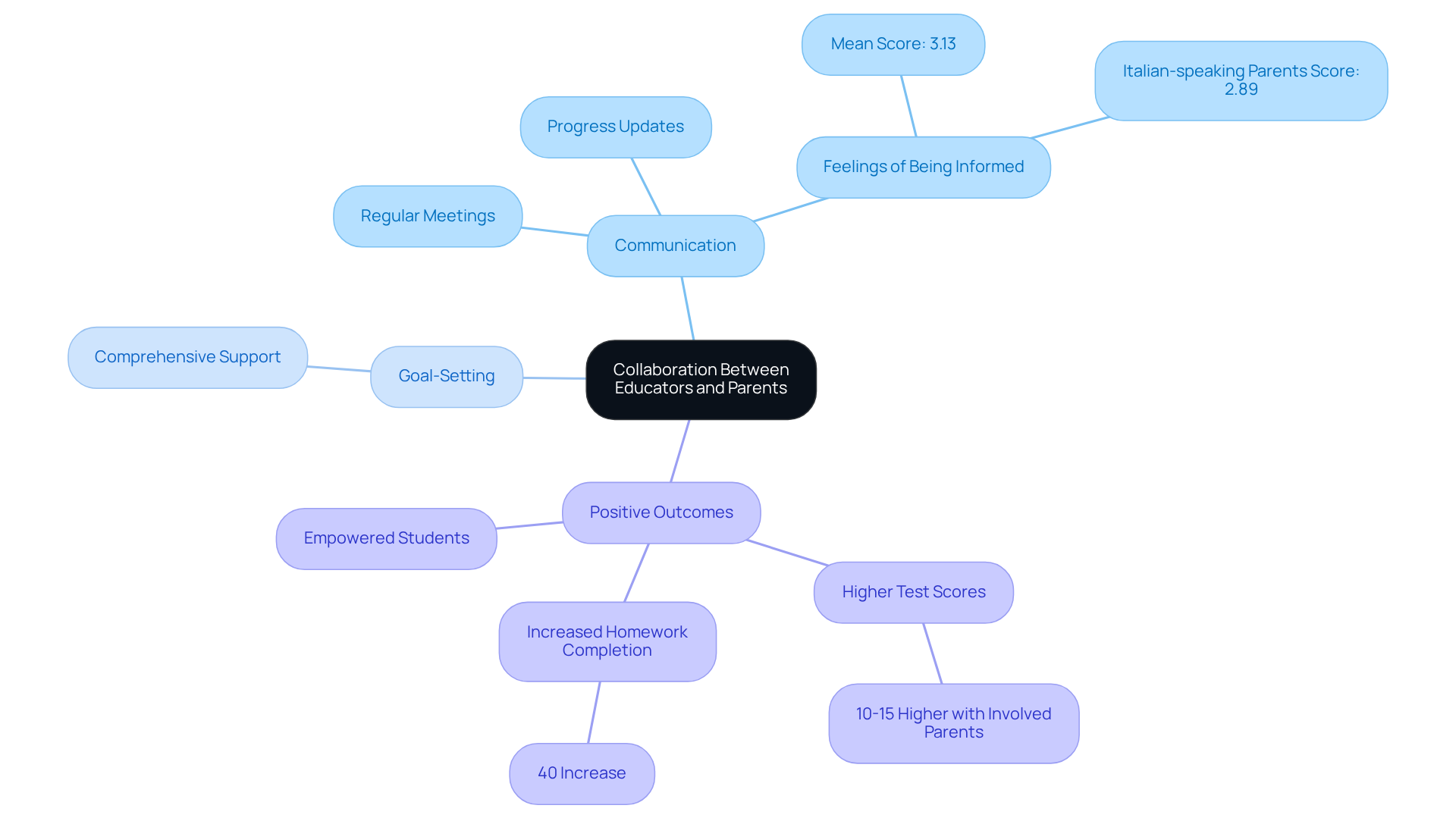
The exploration of essential behavior interventions for effective classroom management highlights the critical need for a multifaceted approach to foster a conducive learning environment. Did you know that the demand for qualified behavior analysts is on the rise? By integrating strategies such as Positive Behavior Interventions and Supports (PBIS), Applied Behavior Analysis (ABA), and proactive management techniques, educators can significantly enhance student engagement and academic success. The collaboration between educators and parents further underscores the necessity of a unified approach in addressing behavioral challenges.
Key insights from the article reveal the effectiveness of tailored Behavior Intervention Plans (BIPs) and the necessity of ongoing teacher training. Research consistently shows that implementing structured behavior interventions leads to measurable improvements in student behavior and learning outcomes. Moreover, data collection and analysis are crucial in refining these interventions, ensuring they meet the diverse needs of learners.
The significance of effective behavior management strategies cannot be overstated. As educational environments evolve, embracing these interventions will not only address immediate behavioral concerns but also lay the groundwork for long-term student development. It is essential for educators, administrators, and parents to commit to these practices.
What is Hire ABA and what does it do?
Hire ABA is a platform that connects Board Certified Behavior Analysts (BCBAs) with job opportunities, addressing the growing demand for BCBAs in the field.
What is the projected increase in demand for BCBAs by 2026?
The demand for BCBAs is projected to increase by 25% by 2026.
How much did job postings for BCBAs increase in 2024?
Job postings for BCBAs surged by 58% in 2024.
How does Hire ABA streamline the hiring process for BCBAs?
Hire ABA uses advanced job fit scoring to match BCBAs with opportunities that align with their skills, preferences, and desired locations.
What challenges does Hire ABA address in the recruitment of BCBAs?
Hire ABA tackles challenges such as low compensation rates and staffing shortages, helping organizations find qualified professionals for behavior interventions.
What support does Hire ABA provide during the job application process?
Hire ABA offers personalized guidance and support throughout the application to negotiation process to facilitate successful job matches.
What is PBIS and how does it benefit educational environments?
Positive Behavior Interventions and Supports (PBIS) is an evidence-driven framework that enhances behavior interventions and improves academic performance by establishing clear expectations and reinforcing positive actions.
What are the outcomes of implementing PBIS in schools?
Schools implementing PBIS experience significant improvements in pupil behavior, with a 33% reduction in office discipline referrals and enhanced academic success, particularly in math and reading.
How many schools have adopted PBIS as of 2025?
As of 2025, PBIS has been adopted in over 16,000 schools nationwide.
What are some key components of an effective PBIS framework?
An effective PBIS framework emphasizes teaching appropriate behavior, recognizing positive actions, and using data-informed decision-making for practice guidance.
What techniques does Applied Behavior Analysis (ABA) include for classroom management?
ABA includes techniques such as reinforcement, prompting, and modeling to enhance specific behaviors and foster positive behavior in classroom settings.
Why is it important to recruit qualified professionals trained in ABA?
Recruiting qualified ABA professionals is crucial for effectively implementing behavior interventions that promote positive learning environments.
How can Hire ABA assist in the recruitment of ABA-trained educators?
Hire ABA connects organizations with knowledgeable and experienced ABA professionals, enhancing their capabilities and supporting effective educational practices.
Our expert recruitment strategies and AI-driven sourcing ensure that you receive top-notch candidates quickly, without compromising on quality. Whether you’re looking for BCBAs, Clinical Directors, or RBTs, we’ve got you covered.